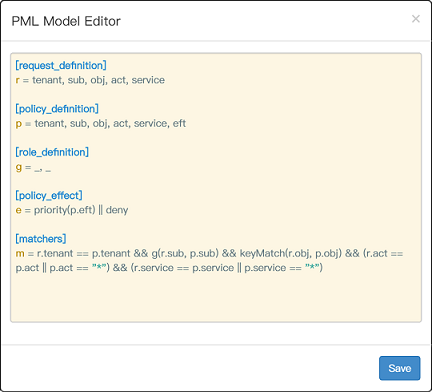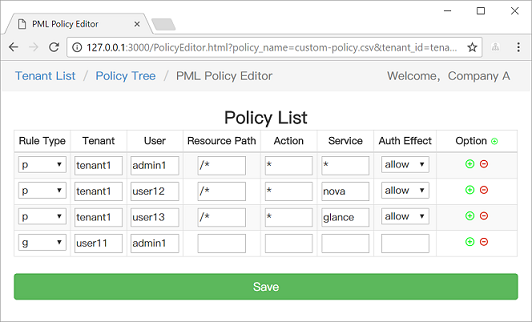News: Are you still worried about how to write the correct Casbin policy? Casbin online editor is coming to help! Try it at: http://casbin.org/editor/
| Operating Systems | Availability status |
|---|---|
| Windows (VS C++) | ✔️ Available |
| Linux | ✔️ Available |
| macOS | ✔️ Available |
 |
 |
 |
 |
|---|---|---|---|
| Casbin | jCasbin | node-Casbin | PHP-Casbin |
| production-ready | production-ready | production-ready | production-ready |
 |
 |
 |
 |
|---|---|---|---|
| PyCasbin | Casbin.NET | Casbin-CPP | Casbin-RS |
| production-ready | production-ready | beta-test | production-ready |
Note: PyCasbin-on-CPP is available to use. Refer to the documentation for installation and usage.
- ACL (Access Control List)
- ACL with superuser
- ACL without users: especially useful for systems that don't have authentication or user log-ins.
- ACL without resources: some scenarios may target for a type of resources instead of an individual resource by using permissions like
write-article,read-log. It doesn't control the access to a specific article or log. - RBAC (Role-Based Access Control)
- RBAC with resource roles: both users and resources can have roles (or groups) at the same time.
- RBAC with domains/tenants: users can have different role sets for different domains/tenants.
- ABAC (Attribute-Based Access Control): syntax sugar like
resource.Ownercan be used to get the attribute for a resource. - RESTful: supports paths like
/res/*,/res/:idand HTTP methods likeGET,POST,PUT,DELETE. - Deny-override: both allow and deny authorizations are supported, deny overrides the allow.
- Priority: the policy rules can be prioritized like firewall rules.
In Casbin, an access control model is abstracted into a CONF file based on the PERM metamodel (Policy, Effect, Request, Matchers). So switching or upgrading the authorization mechanism for a project is just as simple as modifying a configuration. You can customize your own access control model by combining the available models. For example, you can get RBAC roles and ABAC attributes together inside one model and share one set of policy rules.
The most basic and simplest model in Casbin is ACL. ACL's model CONF is:
# Request definition
[request_definition]
r = sub, obj, act
# Policy definition
[policy_definition]
p = sub, obj, act
# Policy effect
[policy_effect]
e = some(where (p.eft == allow))
# Matchers
[matchers]
m = r.sub == p.sub && r.obj == p.obj && r.act == p.act
An example policy for ACL model is like:
p, alice, data1, read
p, bob, data2, write
It means:
- alice can read data1
- bob can write data2
What Casbin does:
- enforce the policy in the classic
{subject, object, action}form or a customized form as you defined, both allow and deny authorizations are supported. - handle the storage of the access control model and its policy.
- manage the role-user mappings and role-role mappings (aka role hierarchy in RBAC).
- support built-in superuser like
rootoradministrator. A superuser can do anything without explict permissions. - multiple built-in operators to support the rule matching. For example,
keyMatchcan map a resource key/foo/barto the pattern/foo*.
What Casbin does NOT do:
- authentication (aka verify
usernameandpasswordwhen a user logs in) - manage the list of users or roles. I believe it's more convenient for the project itself to manage these entities. Users usually have their passwords, and Casbin is not designed as a password container. However, Casbin stores the user-role mapping for the RBAC scenario.
https://casbin.org/docs/overview
You can also use the online editor (https://casbin.org/editor/) to write your Casbin model and policy in your web browser. It provides functionality such as syntax highlighting and code completion, just like an IDE for a programming language.
https://casbin.org/docs/tutorials
Here is a working project to demonstarte how to set up your CMake configurations to integrate casbin without any prior installations.
You may integrate casbin into your CMake project through find_package. It is assumed that you're using CMake >= v3.19.
You must have casbin installed on your system OR have it fetched from GitHub through FetchContent.
Here's what your Findcasbin.cmake file should be:
include(FetchContent)
FetchContent_Declare(
casbin
GIT_REPOSITORY https://github.com/casbin/casbin-cpp.git
GIT_TAG v1.38.1
)
set(CASBIN_BUILD_TEST OFF) # If you don't need to build tests for casbin
set(CASBIN_BUILD_BENCHMARK OFF) # If you don't need to build benchmarks for casbin
set(CASBIN_BUILD_BINDINGS OFF) # If you don't need language bindings provided by casbin
set(CASBIN_BUILD_PYTHON_BINDINGS OFF) # If you don't need python bindings provided by casbin
# Making casbin and its targets accessible to our project
FetchContent_MakeAvailable(casbin)
FetchContent_GetProperties(casbin)
# If casbin wasn't populated, then manually populate it
if(NOT casbin_POPULATED)
FetchContent_Populate(casbin)
add_subdirectory(${casbin_SOURCE_DIR} ${casbin_BINARY_DIR})
endif()Now that casbin's targets are available to your project, your may link your own targets against casbin's likewise:
add_executable(myexec main.cpp)
target_link_libraries(myexec PRIVATE casbin)
set(myexec_INCLUDE_DIR ${casbin_SOURCE_DIR}/include)
target_include_directories(myexec PRIVATE ${myexec_INCLUDE_DIR})Do remember to include casbin_SOURCE_DIR/include directory wherever casbin's functions are utilised.
You may integrate casbin into your CMake project through find_package.
It is assumed that you're using CMake >= v3.19
-
Clone/checkout to
casbin/casbin-cpp:mastergit clone https://github.com/casbin/casbin-cpp.git
-
Open terminal/cmd in the root directory of the project:
mkdir build cd build cmake ..Note: Look up for the logs of this step. And add the path indicated by the log into your PATH/project include directory. The log message you're looking for should be something like this:
[casbin]: Installing casbin ... [casbin]: Installing casbin ... - The targets can now be imported with find_package(casbin) [casbin]: Build the "install" target and add "/usr/local/include" to you PATH for casbin to work
-
After the project is configured successfully, build it:
cmake --build . --config Release -
Install casbin:
cmake --build . --config Release --target installNow, casbin has been installed and ready to go.
-
In your project's CMake file, add
find_package(casbin REQUIRED)
This will import all the targets exported by casbin to your project
-
Link against casbin (Refer to Step 2's Note to get the value of
MY_INCLUDE_DIRfor your system):set(MY_INCLUDE_DIR "/usr/local/include") target_include_directories(MyTargetName PRIVATE ${MY_INCLUDE_DIR}) target_link_libraries(MyTargetName PRIVATE casbin::casbin)
(Assuming you have CMake v3.19 or later installed)
-
Clone/checkout to
casbin/casbin-cpp:mastergit clone https://github.com/casbin/casbin-cpp.git
-
Open terminal/cmd in the root directory of the project:
Note: On Windows, this command will also create Visual Studio project files in the
/builddirectory.mkdir build cd build cmake .. -
After the project is configured successfully, build it:
cmake --build . -
To install casbin library to your machine run:
cmake --build . --target install- For Windows, this will install
casbin.libto<custom-path>/casbin-cpp/build/casbinand the headers toC:/Program Files/casbin/include. - For Unix based OS i.e. Linux and macOS, this will install
casbin.ato<custom-path>/casbin-cpp/build/casbinand the headers tousr/local/include.
You can add the respective include and lib paths to the PATH environment variable to use casbin.
- For Windows, this will install
-
(OPTIONAL) To run the tests, issue the following command from
/build:ctest
-
Add the include directory of the project to the PATH Environment variable.
#include <casbin/casbin.h>
-
Make a new a
casbin::Enforcerwith a model file and a policy file:casbin::Enforcer e("./path/to/model.conf", "./path/to/policy.csv");
-
Add an enforcement hook into your code right before the access happens:
std::string sub = "alice"; // the user that wants to access a resource. std::string obj = "data1"; // the resource that is going to be accessed. std::string act = "read"; // the operation that the user performs on the resource. if(e.Enforce({ sub, obj, act })) { // permit alice to read data1 } else { // deny the request, show an error }
-
Besides the static policy file, Casbin also provides API for permission management at run-time. For example, You can get all the roles assigned to a user as below:
std::vector<std::string> roles( e.GetImplicitRolesForUser(sub) );
Here's the summary:
#include <casbin/casbin.h>
#include <string>
void IsAuthorized() {
casbin::Enforcer e("./path/to/model.conf", "./path/to/policy.csv");
std::string sub = "alice"; // the user that wants to access a resource.
std::string obj = "data1"; // the resource that is going to be accessed.
std::string act = "read"; // the operation that the user performs on the resource.
if(e.Enforce({ sub, obj, act })) {
// permit alice to read data1
} else {
// deny the request, show an error
}
}Casbin provides two sets of APIs to manage permissions:
- Management API: the primitive API that provides full support for Casbin policy management.
- RBAC API: a more friendly API for RBAC. This API is a subset of Management API. The RBAC users could use this API to simplify the code.
We also provide a web-based UI for model management and policy management:
https://casbin.org/docs/adapters
https://casbin.org/docs/watchers
https://casbin.org/docs/role-managers
| Model | Model file | Policy file |
|---|---|---|
| ACL | basic_model.conf | basic_policy.csv |
| ACL with superuser | basic_model_with_root.conf | basic_policy.csv |
| ACL without users | basic_model_without_users.conf | basic_policy_without_users.csv |
| ACL without resources | basic_model_without_resources.conf | basic_policy_without_resources.csv |
| RBAC | rbac_model.conf | rbac_policy.csv |
| RBAC with resource roles | rbac_model_with_resource_roles.conf | rbac_policy_with_resource_roles.csv |
| RBAC with domains/tenants | rbac_model_with_domains.conf | rbac_policy_with_domains.csv |
| ABAC | abac_model.conf | N/A |
| RESTful | keymatch_model.conf | keymatch_policy.csv |
| Deny-override | rbac_model_with_deny.conf | rbac_policy_with_deny.csv |
| Priority | priority_model.conf | priority_policy.csv |
Authz middlewares for web frameworks: https://casbin.org/docs/middlewares
https://casbin.org/docs/adopters
Please read the contributing guide.
This project exists thanks to all the people who contribute.
Thank you to all our backers! 🙏 [Become a backer]
Support this project by becoming a sponsor. Your logo will show up here with a link to your website. [Become a sponsor]
This project is licensed under the Apache 2.0 license.
If you have any issues or feature requests, please contact us. PR is welcomed.
- https://github.com/casbin/casbin-cpp/issues
- [email protected]
- Tencent QQ group: 546057381



















